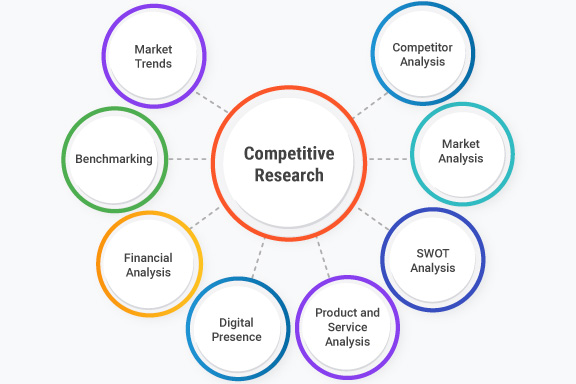In the ever-evolving world of SEO, staying ahead of the competition requires more than just optimizing your website; it involves understanding what your competitors are doing right—and wrong. Competitor research is a crucial component of a robust SEO strategy that can provide valuable insights and give you an edge in the digital marketplace. In this article, we’ll explore how to effectively conduct competitor research and leverage those findings to enhance your SEO efforts.
Key Features Of Competitor Research:
1. Identifying Your Competitors:
The first step in competitor research is to identify who your competitors are. They can be categorized into two types:
- Direct Competitors: These are businesses that offer the same products or services and target the same audience as you.
- Indirect Competitors: These businesses offer different products or services but may still compete for the same customer base.
To identify them, perform a simple Google search using keywords relevant to your business. Take note of the companies that consistently appear in the top results.
2. Analyzing Competitor Keywords:
Understanding the keywords your competitors are targeting can provide valuable insights into their SEO strategy. Use tools like Ahrefs, SEMrush, or Google Keyword Planner to analyze:
- Top Keywords: Find out which keywords drive the most traffic to their site.
- Keyword Gaps: Identify keywords they rank for that you don’t, presenting opportunities for you to target new terms.
3. Reviewing Competitor Content:
Content is king in the world of SEO. Evaluate your competitors’ content strategies by examining:
- Content Topics: What subjects are they covering? Are there gaps in their content that you can exploit?
- Content Quality: Assess the depth, quality, and engagement of their content. Is it well-researched and informative?
- Content Format: What types of content are they using? (e.g., blogs, infographics, videos)
4. Analyzing Backlink Profiles:
Backlinks are a key factor Backlinks are a key factor in search engine rankings. Tools like Moz’s Link Explorer or Ahrefs can help you analyze:
- Backlink Sources: Identify where their backlinks are coming from and assess the quality of these sources.
- Link Building Strategies: Understand their approach to acquiring backlinks. Are they leveraging guest posts, partnerships, or other tactics?
5. Reviewing Site Structure and UX:
A well-structured website enhances user experience and SEO performance. Analyze your competitors’:
- Site Navigation: Is their site easy to navigate? How is the information structured?
- Mobile Friendliness: How well does their site perform on mobile devices?
- Page Speed: Tools like Google PageSpeed Insights can help you assess their site speed.
6. Monitoring Social Media Activity:
Social media can drive significant traffic and impact SEO. Review your competitors’ social media presence by:
- Content Strategy: What type of content are they sharing? How frequently?
- Engagement Rates: How much interaction are they getting from their audience?
- Audience Interaction: How do they engage with their followers?
7. Leveraging Competitor Insights for Your SEO Strategy:
Once you’ve gathered all this information, use it to refine your own SEO strategy. Focus on:
- Improving Content: Fill gaps in your content strategy and enhance the quality of your existing content.
- Targeting New Keywords: Incorporate valuable keywords that your competitors are ranking for but you are not.
- Building Quality Backlinks: Develop a strategy to acquire high-quality backlinks from reputable sources.
8. Regularly Update Your Competitor Research:
The digital landscape is dynamic, and so are your competitors. Regularly update your research to keep up with their strategies and adapt your SEO tactics accordingly.
Conclusion:
Competitor research is more than just a way to stay informed; it’s a strategic tool that can drive your SEO success. By understanding what your competitors are doing, you can uncover opportunities, avoid their mistakes, and position your brand for growth. Start incorporating competitor research into your SEO strategy today and watch as your online presence strengthens.



